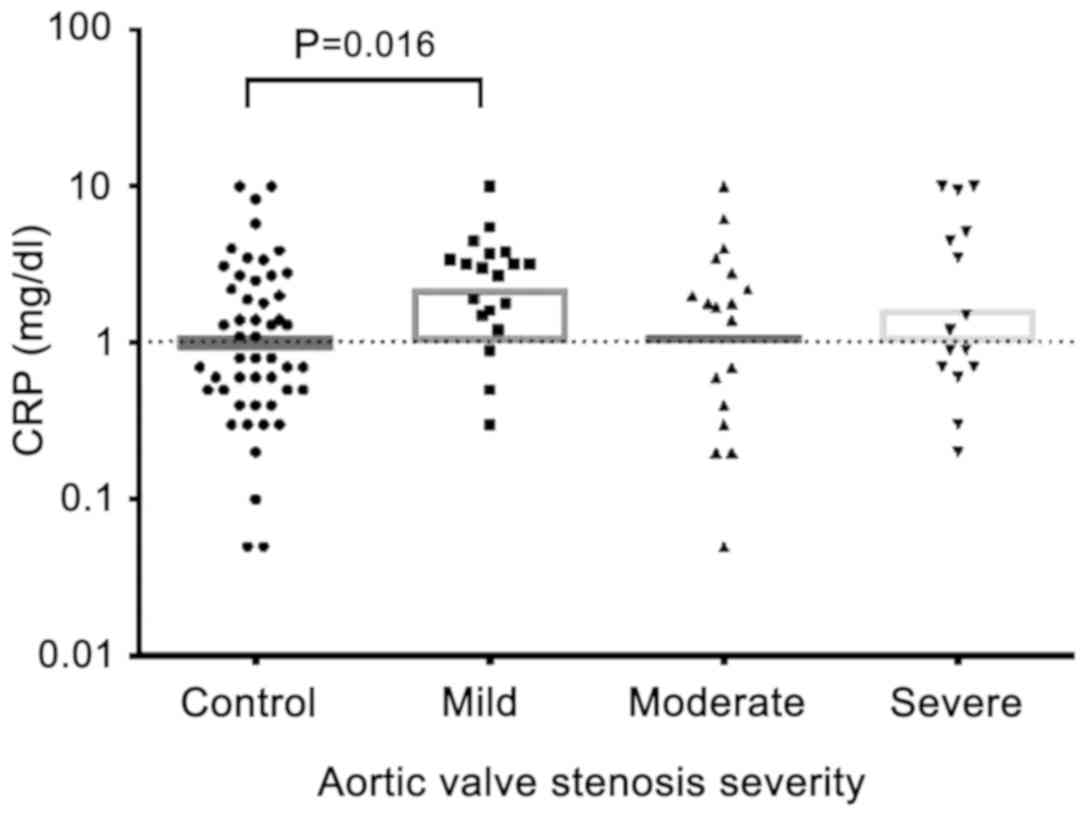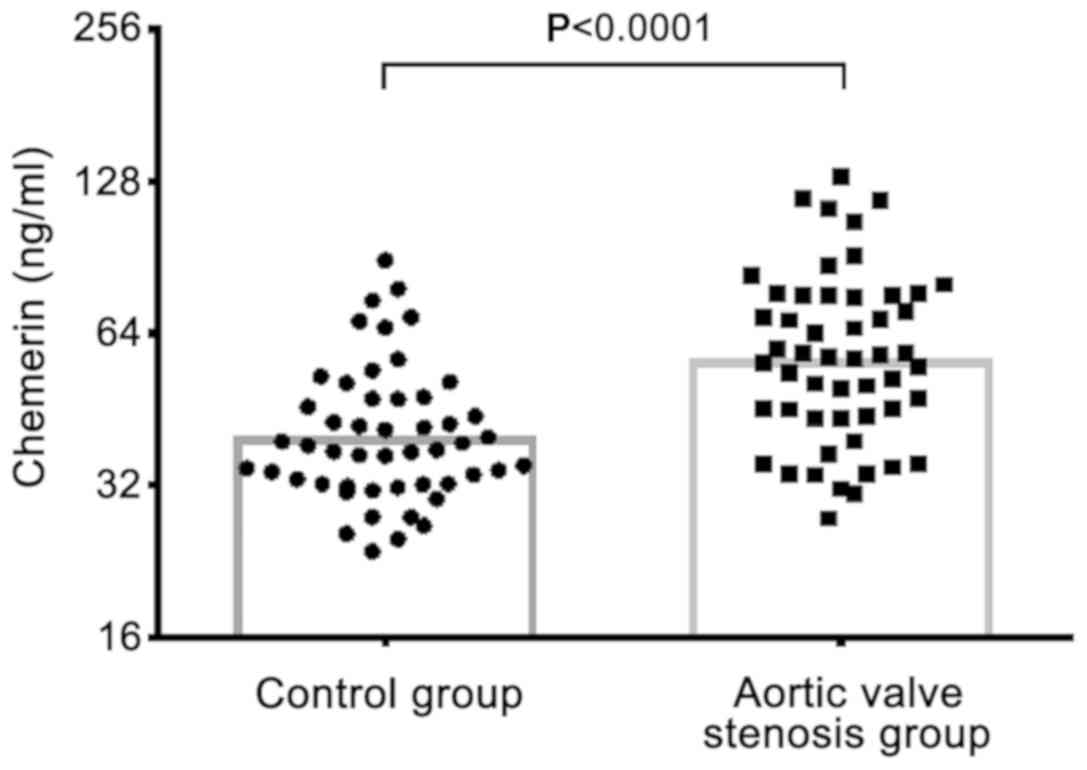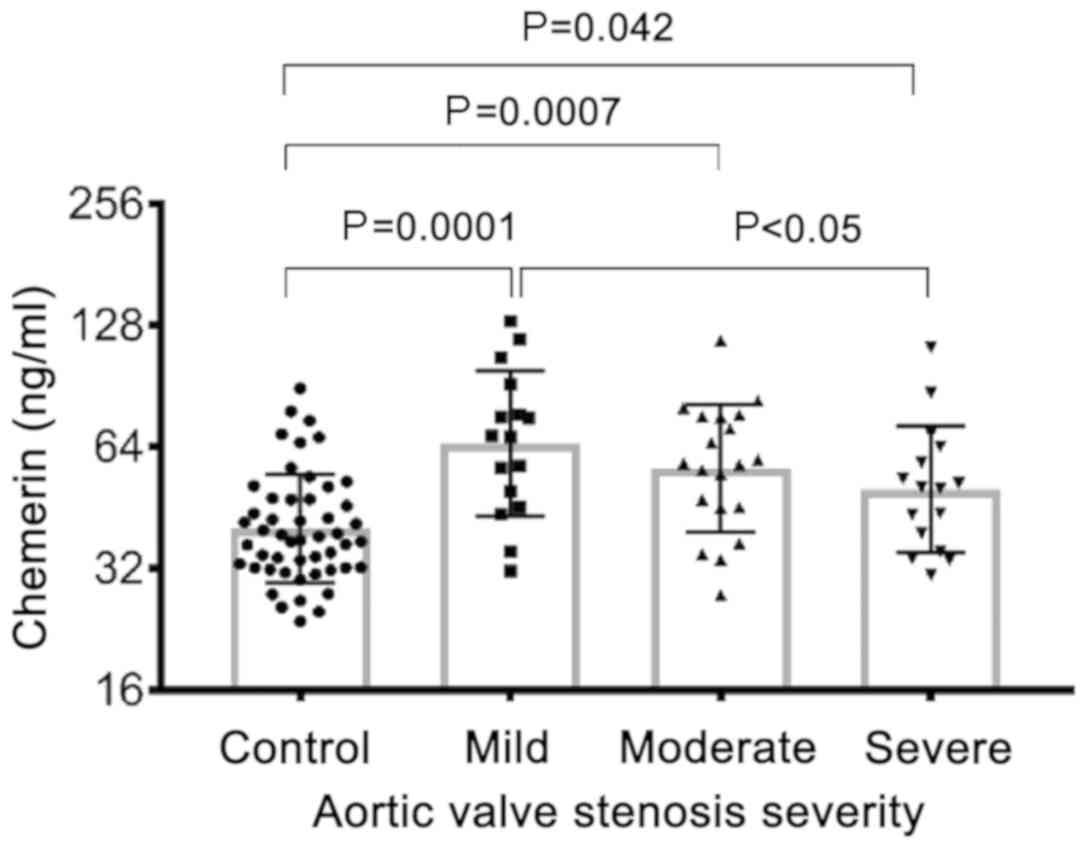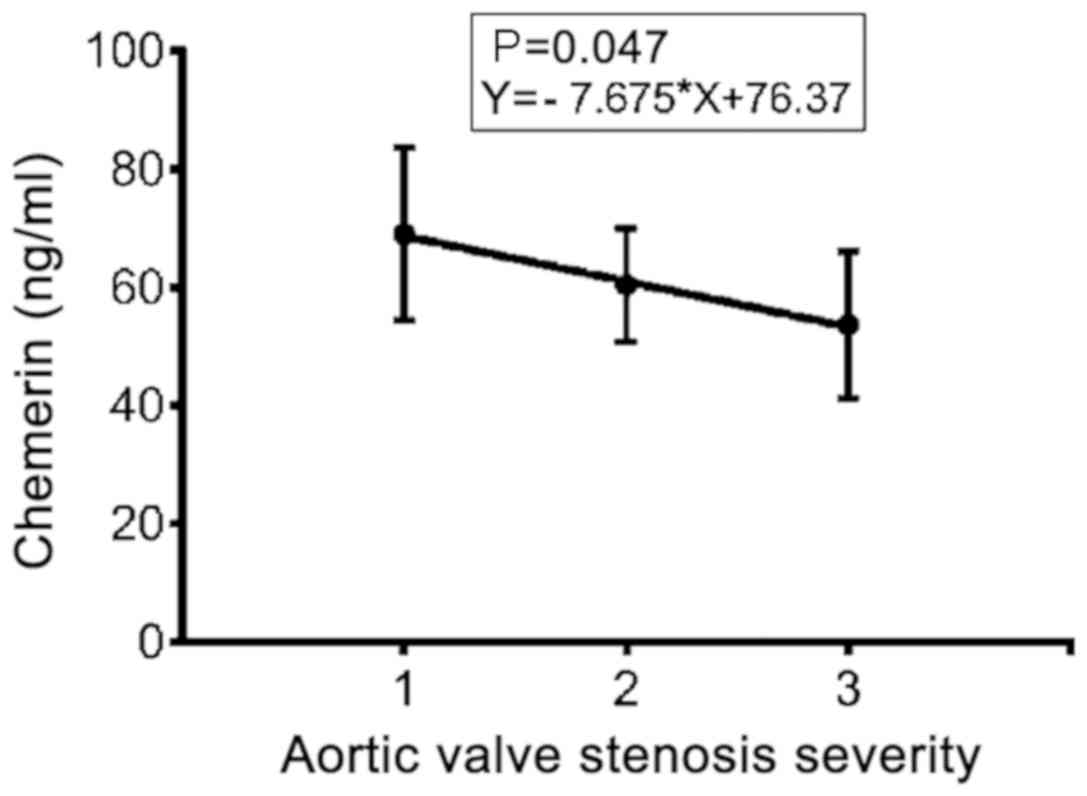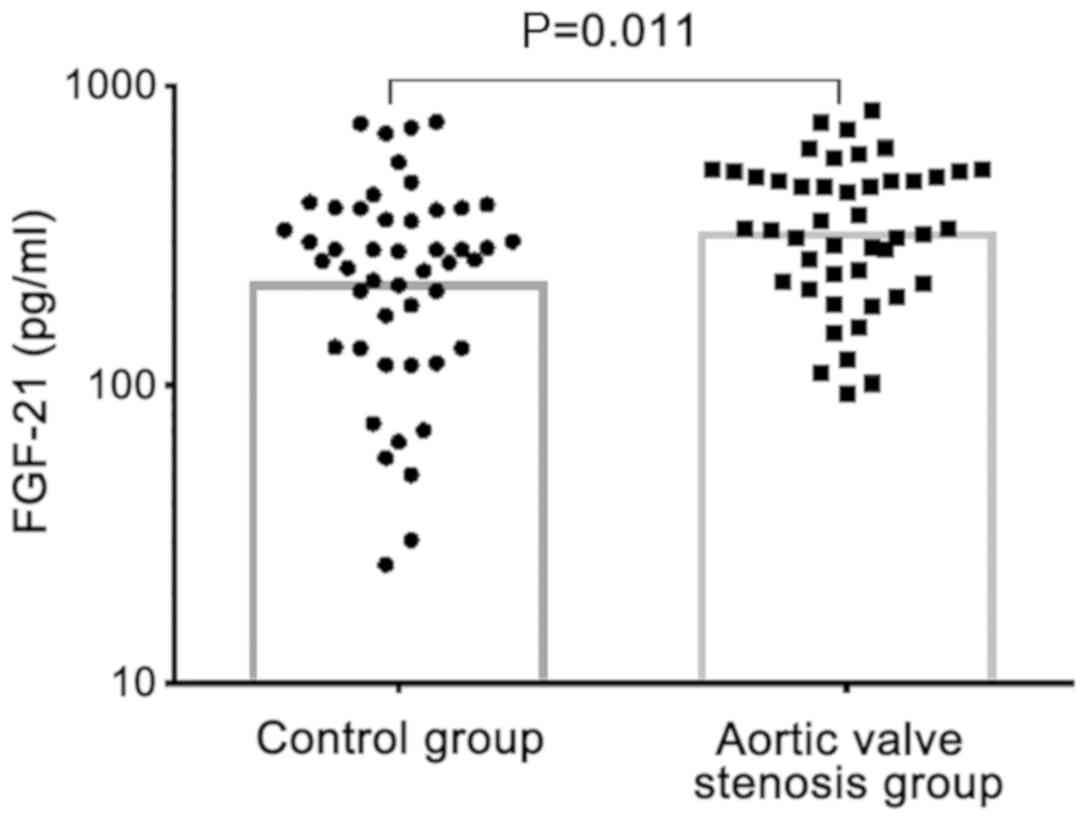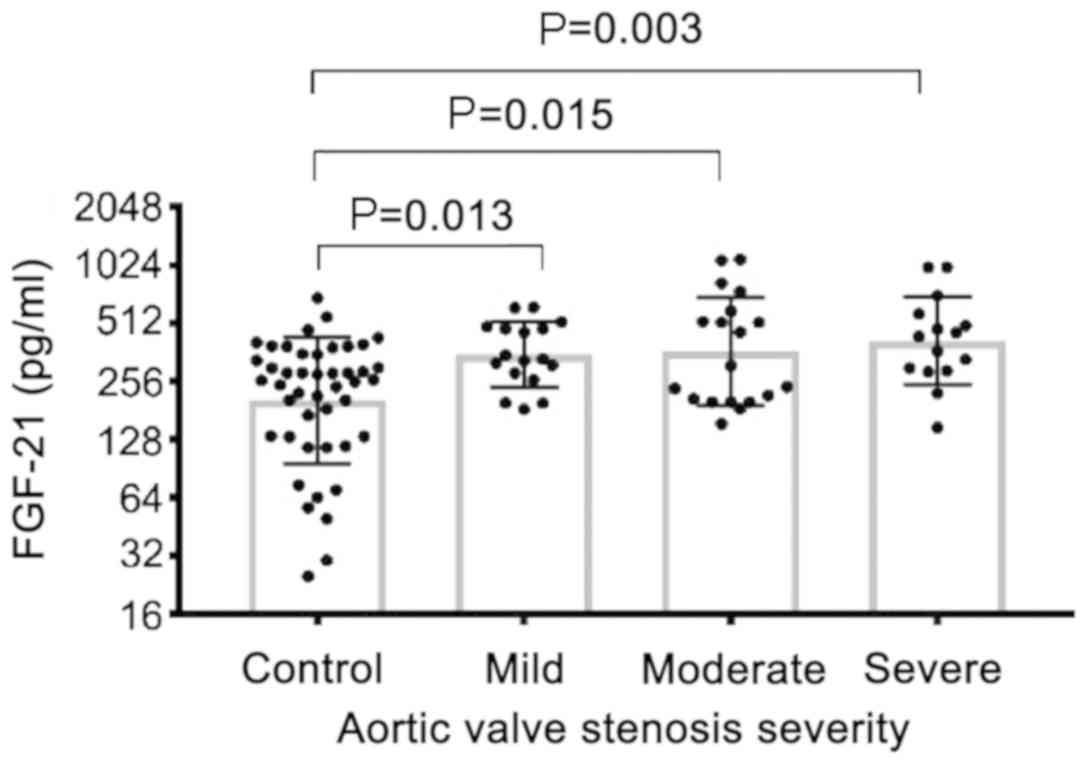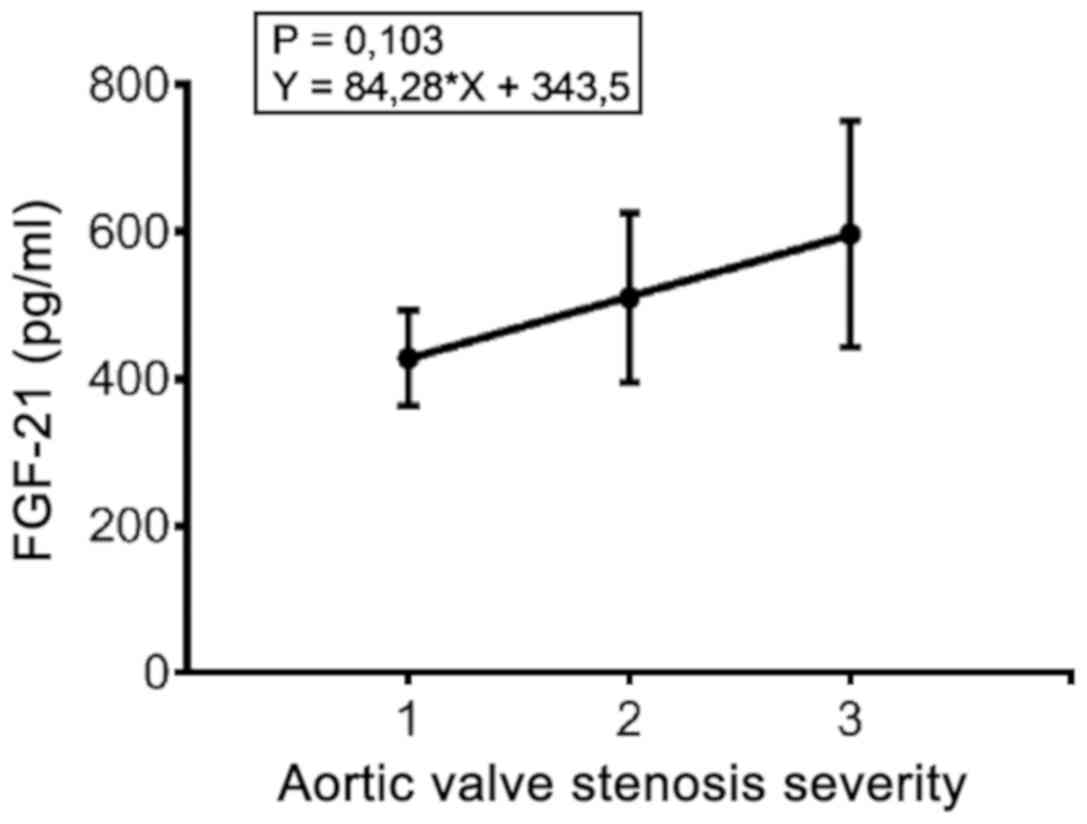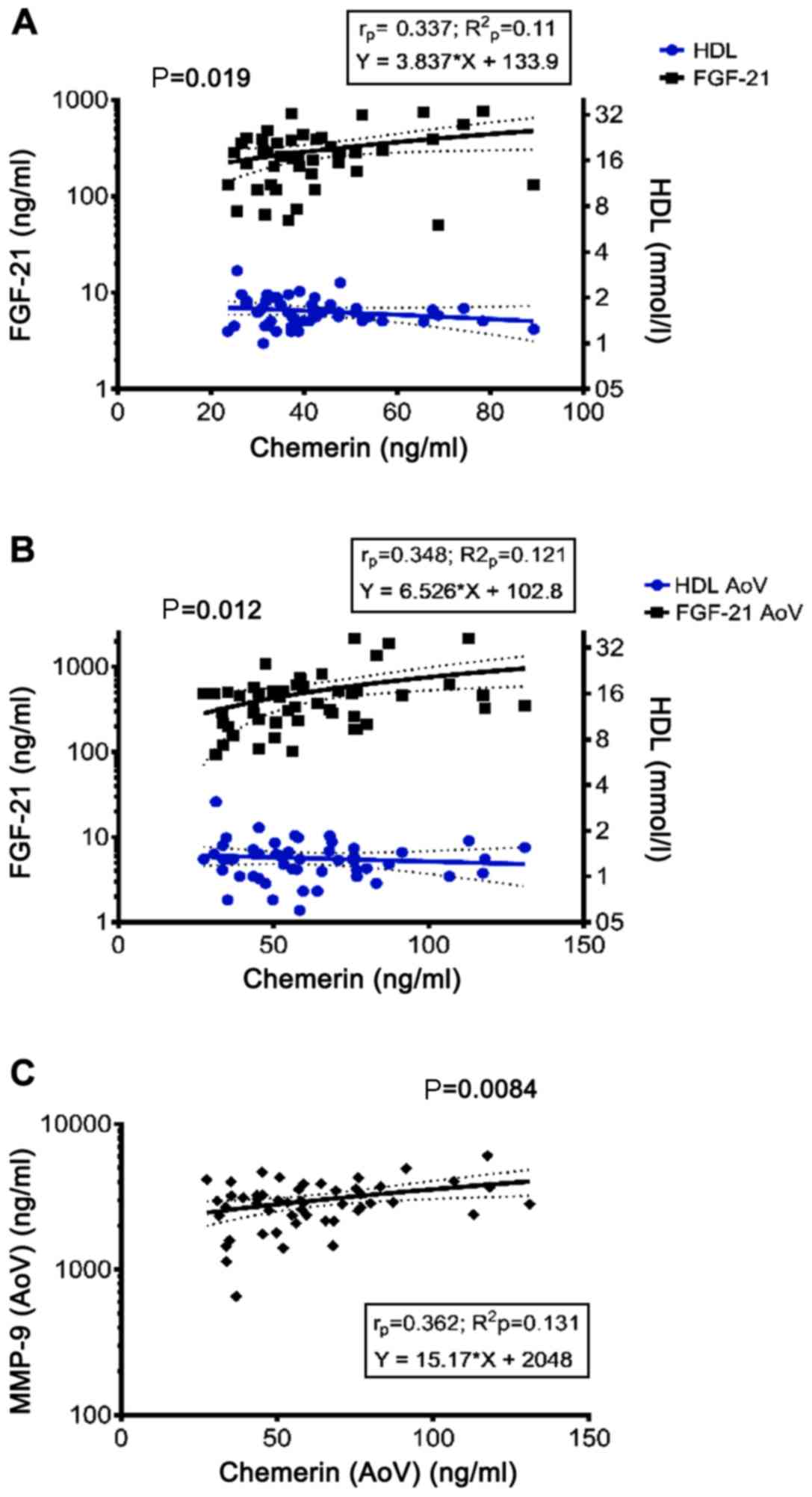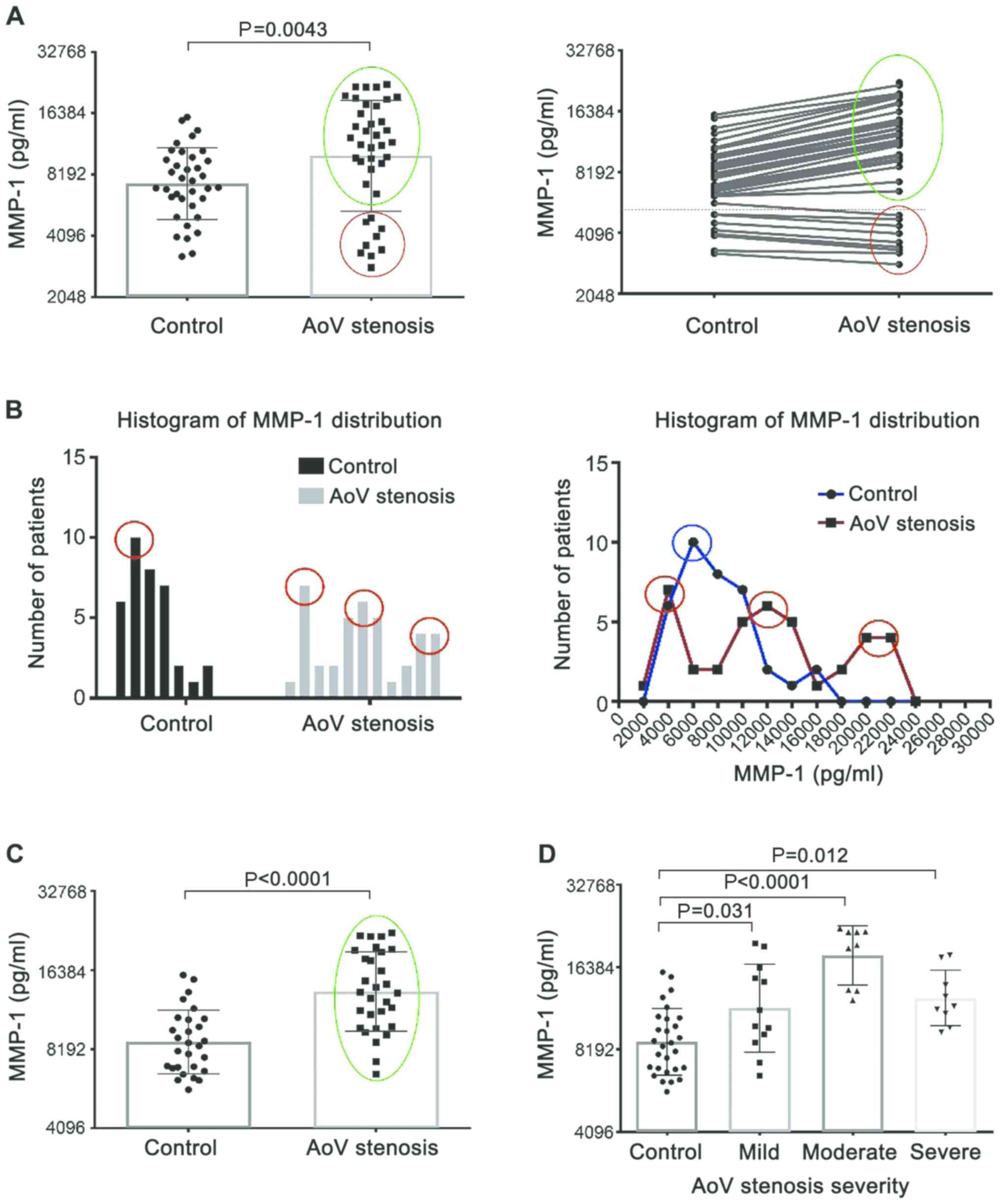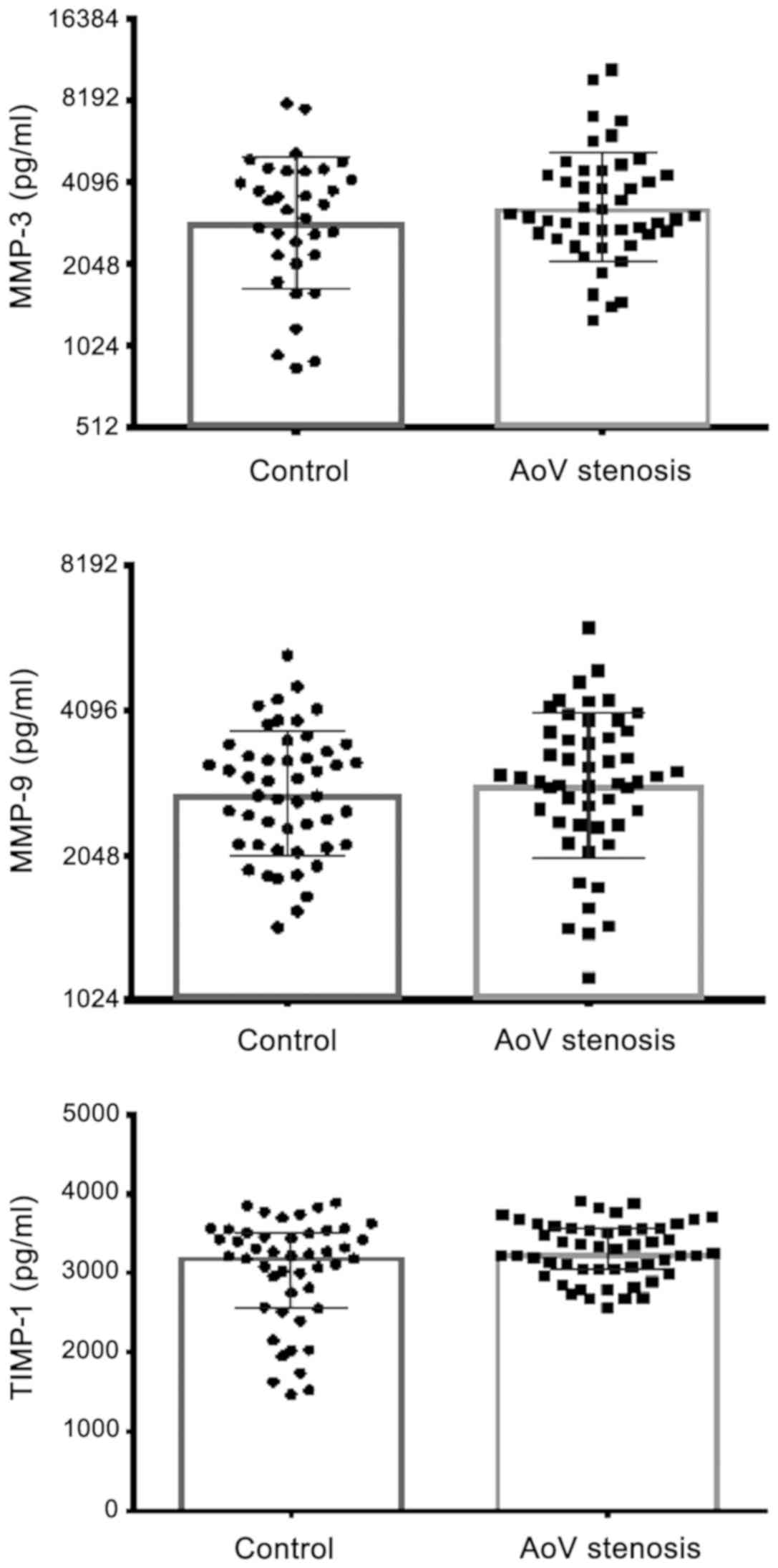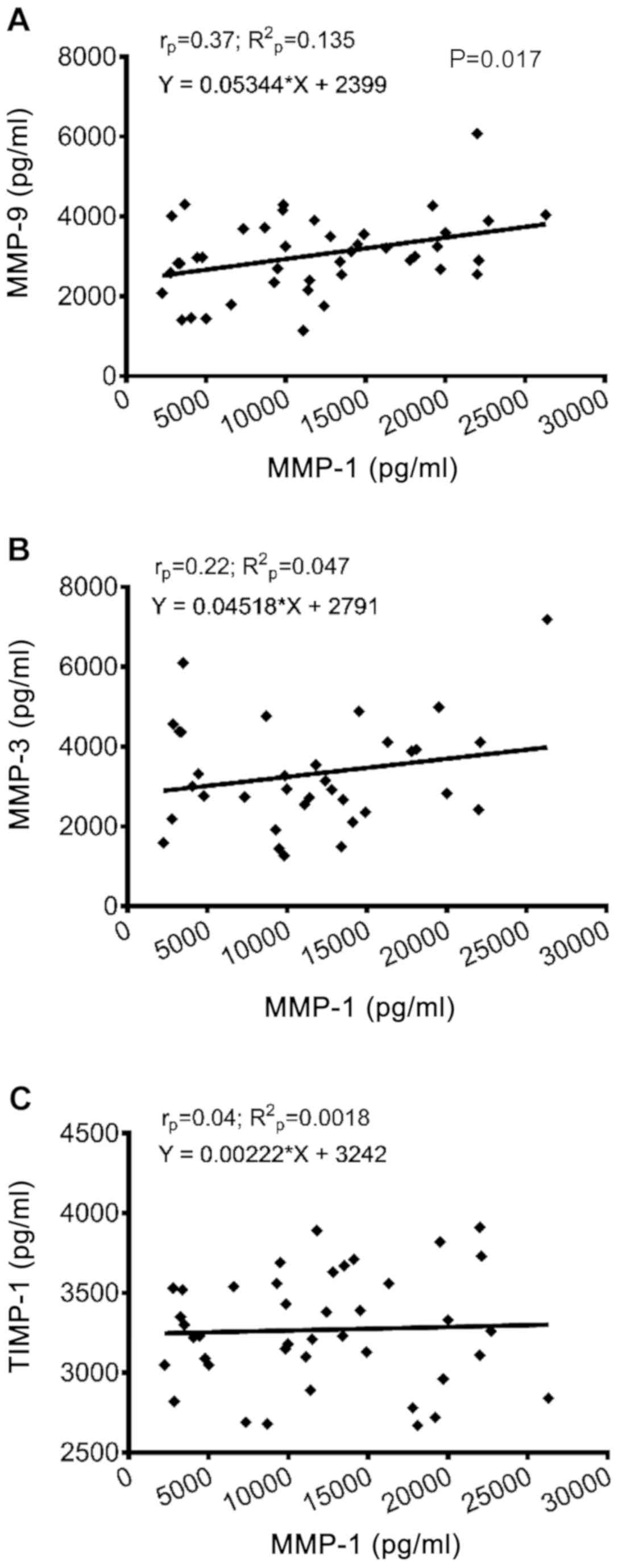|
1
|
Beckmann E, Grau JB, Sainger R, Poggio P
and Ferrari G: Insights into the use of biomarkers in calcific
aortic valve disease. J Heart Valve Dis. 19:441–452.
2010.PubMed/NCBI
|
|
2
|
Eveborn GW, Schirmer H, Heggelund G, Lunde
P and Rasmussen K: The evolving epidemiology of valvular aortic
stenosis. The tromsø study. Heart. 99:396–400. 2013. View Article : Google Scholar : PubMed/NCBI
|
|
3
|
Stewart BF, Siscovick D, Lind BK, Gardin
JM, Gottdiener JS, Smith VE, Kitzman DW and Otto CM: Clinical
factors associated with calcific aortic valve disease.
Cardiovascular health study. J Am Coll Cardiol. 29:630–634. 1997.
View Article : Google Scholar : PubMed/NCBI
|
|
4
|
Cosmi JE, Kort S, Tunick PA, Rosenzweig
BP, Freedberg RS, Katz ES, Applebaum RM and Kronzon I: The risk of
the development of aortic stenosis in patients with ‘benign’ aortic
valve thickening. Arch Intern Med. 162:2345–2347. 2002. View Article : Google Scholar : PubMed/NCBI
|
|
5
|
Ren X: Aortic stenosis. https://emedicine.medscape.com/article/150638-overviewUpdated
October 7, 2013. December 29–2013
|
|
6
|
Otto CM and Prendergast B: Aortic-valve
stenosis-From patients at risk to severe valve obstruction. N Engl
J Med. 371:744–756. 2014. View Article : Google Scholar : PubMed/NCBI
|
|
7
|
Lindman BR, Clavel MA, Mathieu P, Iung B,
Lancellotti P, Otto CM and Pibarot P: Calcific aortic stenosis. Nat
Rev Dis Primers. 3:160062016. View Article : Google Scholar
|
|
8
|
Kaden JJ, Dempfle CE, Grobholz R, Tran HT
and Kiliç R: Sarikoç A, Brueckmann M, Vahl C, Hagl S, Haase KK and
Borggrefe M: Interleukin-1 beta promotes matrix metalloproteinase
expression and cell proliferation in calcific aortic valve
stenosis. Atherosclerosis. 170:205–211. 2003. View Article : Google Scholar : PubMed/NCBI
|
|
9
|
Kaden JJ, Dempfle CE, Grobholz R, Fischer
CS, Vocke DC, Kiliç R, Sarikoç A, Piñol R, Hagl S, Lang S, et al:
Inflammatory regulation of extracellular matrix remodeling in
calcific aortic valve stenosis. Cardiovasc Pathol. 14:80–87. 2005.
View Article : Google Scholar : PubMed/NCBI
|
|
10
|
Kaden JJ, Dempfle CE and Kiliç R: Sarikoç
A, Hagl S, Lang S, Brueckmann M and Borggrefe M: Influence of
receptor activator of nuclear factor kappa B on human aortic valve
myofibroblasts. Exp Mol Pathol. 78:36–40. 2005. View Article : Google Scholar : PubMed/NCBI
|
|
11
|
Yetkin E and Waltenberger J: Molecular and
cellular mechanisms of aortic stenosis. Int J Cardiol. 135:4–13.
2009. View Article : Google Scholar : PubMed/NCBI
|
|
12
|
Nagase H and Woessner JF Jr: Matrix
metalloproteinases. J Biol Chem. 274:21491–21494. 1999. View Article : Google Scholar : PubMed/NCBI
|
|
13
|
Fondard O, Detaint D, Iung B, Choqueux C,
Adle-Biassette H, Jarraya M, Hvass U, Couetil JP, Henin D, Michel
JB, et al: Extracellular matrix remodelling in human aortic valve
disease: The role of matrix metalloproteinases and their tissue
inhibitors. Eur Heart J. 26:1333–1341. 2005. View Article : Google Scholar : PubMed/NCBI
|
|
14
|
Heymans S, Schroen B, Vermeersch P,
Milting H, Gao F, Kassner A, Gillijns H, Herijgers P, Flameng W,
Carmeliet P, et al: Increased cardiac expression of tissue
inhibitor of metalloproteinase-1 and tissue inhibitor of
metalloproteinase-2 is related to cardiac fibrosis and dysfunction
in the chronic pressure-overloaded human heart. Circulation.
112:1136–1144. 2005. View Article : Google Scholar : PubMed/NCBI
|
|
15
|
Papazafiropoulou A and Tentolouris N:
Matrix metalloproteinases and cardiovascular diseases. Hippokratia.
13:76–82. 2009.PubMed/NCBI
|
|
16
|
Blankenberg S, Rupprecht HJ, Poirier O,
Bickel C, Smieja M, Hafner G, Meyer J, Cambien F, Tiret L and
AtheroGene Investigators: Plasma concentrations and genetic
variation of matrix metalloproteinase 9 and prognosis of patients
with cardiovascular disease. Circulation. 107:1579–1585. 2003.
View Article : Google Scholar : PubMed/NCBI
|
|
17
|
Regn M, Laggerbauer B, Jentzsch C,
Ramanujam D, Ahles A, Sichler S, Calzada-Wack J, Koenen RR, Braun
A, Nieswandt B and Engelhardt S: Peptidase inhibitor 16 is a
membrane-tethered regulator of chemerin processing in the
myocardium. J Mol Cell Cardiol. 99:57–64. 2016. View Article : Google Scholar : PubMed/NCBI
|
|
18
|
Domouzoglou EM, Naka KK, Vlahos AP,
Papafaklis MI, Michalis LK, Tsatsoulis A and Maratos-Flier E:
Fibroblast growth factors in cardiovascular disease: The emerging
role of FGF21. Am J Physiol Heart Circ Physiol. 309:H1029–H1038.
2015. View Article : Google Scholar : PubMed/NCBI
|
|
19
|
Han XY, Chen CY, Cheng G, Xie C, Yang M,
Shou XL and Sun C: Serum fibroblast growth factor 21 levels are
increased in atrial fibrillation patients. Cytokine. 73:176–180.
2015. View Article : Google Scholar : PubMed/NCBI
|
|
20
|
Planavila A, Redondo-Angulo I and
Villarroya F: FGF21 and cardiac physiopathology. Front Endocrinol
(Lausanne). 6:133–139. 2015. View Article : Google Scholar : PubMed/NCBI
|
|
21
|
Schumacher JD and Guo GL: Regulation of
hepatic stellate cells and fibrogenesis by fibroblast growth
factors. Biomed Res Int. 2016:83237472016. View Article : Google Scholar : PubMed/NCBI
|
|
22
|
Vahanian A, Alfieri O, Andreotti F,
Antunes MJ, Barón-Esquivias G, Baumgartner H, Borger MA, Carrel TP,
De Bonis M, et al: Guidelines on the management of valvular heart
disease (version 2012): The joint task force on the management of
valvular heart disease of the European society of cardiology (ESC)
and the European association for cardio-thoracic surgery (EACTS).
Eur Heart J. 33:2451–2496. 2012. View Article : Google Scholar : PubMed/NCBI
|
|
23
|
Lifshitz MS: Preanalysis. Blood collection
overview. In: Henry's clinical diagnosis and management by
laboratory methods, 23e. McPherson RA and Pincus MR: Elsevier Inc.
(St Louis, Missouri). 24–26. 2017.PubMed/NCBI
|
|
24
|
Trinder P: Determination of glucose in
blood using glucose oxidase with an alternative oxygen acceptor.
Ann Clin Biochem. 6:24–27. 1969. View Article : Google Scholar
|
|
25
|
Izawa S, Okada M, Matsui H and Horita YJ:
Quantitative determination of HDL cholesterol IVD. Med Pharm Sci.
37:1385–1388. 1997.
|
|
26
|
Benjamini Y, Krieger AM and Yekutieli D:
Adaptive linear step-up procedures that control the false discovery
rate. Biometrika. 93:491–507. 2006. View Article : Google Scholar
|
|
27
|
Lang RM, Bierig M, Devereux RB,
Flachskampf FA, Foster E, Pellikka PA, Picard MH, Roman MJ, Seward
J, Shanewise JS, et al: Recommendations for chamber quantification.
J Am Soc Echocardiogr. 18:1440–1463. 2005. View Article : Google Scholar : PubMed/NCBI
|
|
28
|
Solache-Berrocal G, Barral A, Martín M,
Román-García P, Llosa JC, Naves-Díaz M, Cannata-Andía JB and
Rodríguez I: The association of MMP1 1G>2G polymorphism with
aortic valve. Rev Osteoporos Metab Miner. 8:115–120. 2016.
|
|
29
|
Mohty D, Pibarot P, Després JP, Côté C,
Arsenault B, Cartier A, Cosnay P, Couture C and Mathieu P:
Association between plasma LDL particle size, valvular accumulation
of oxidized LDL, and inflammation in patients with aortic stenosis.
Arterioscler Thromb Vasc Biol. 28:187–193. 2008. View Article : Google Scholar : PubMed/NCBI
|
|
30
|
Satta J, Oiva J, Salo T, Eriksen H,
Ohtonen P, Biancari F, Juvonen TS and Soini Y: Evidence for an
altered balance between matrix metalloproteinase-9 and its
inhibitors in calcific aortic stenosis. Ann Thorac Surg.
76:681–688. 2003. View Article : Google Scholar : PubMed/NCBI
|
|
31
|
Rourke JL, Dranse HJ and Sinal CJ: Towards
an integrative approach to understanding the role of chemerin in
human health and disease. Obes Rev. 14:245–262. 2013. View Article : Google Scholar : PubMed/NCBI
|
|
32
|
Mariani F and Roncucci L: Chemerin/chemR23
axis in inflammation onset and resolution. Inflamm Res. 64:85–95.
2015. View Article : Google Scholar : PubMed/NCBI
|
|
33
|
Galante A, Pietroiusti A, Vellini M,
Piccolo P, Possati G, De Bonis M, Grillo RL, Fontana C and Favalli
C: C-reactive protein is increased in patients with degenerative
aortic valvular stenosis. J Am Coll Cardiol. 38:1078–1082. 2001.
View Article : Google Scholar : PubMed/NCBI
|
|
34
|
Ardans JA, Economou AP, Martinson JM Jr,
Zhou M and Wahl LM: Oxidized low-density and high-density
lipoproteins regulate the production of matrix metalloproteinase-1
and −9 by activated monocytes. J Leukoc Biol. 71:1012–1018.
2002.PubMed/NCBI
|
|
35
|
Death AK, Fisher EJ, McGrath KC and Yue
DK: High glucose alters matrix metalloproteinase expression in two
key vascular cells: Potential impact on atherosclerosis in
diabetes. Atherosclerosis. 168:263–269. 2003. View Article : Google Scholar : PubMed/NCBI
|
|
36
|
Eickelberg O, Roth M, Mussmann R, Rüdiger
JJ, Tamm M, Perruchoud AP and Block LH: Calcium channel blockers
activate the interleukin-6 gene via the transcription factors
NF-IL6 and NF-kappaB in primary human vascular smooth muscle cells.
Circulation. 99:2276–2282. 1999. View Article : Google Scholar : PubMed/NCBI
|
|
37
|
Funck RC, Wilke A, Rupp H and Brilla CG:
Regulation and role of myocardial collagen matrix remodeling in
hypertensive heart disease. Adv Exp Med Biol. 432:35–44. 1997.
View Article : Google Scholar : PubMed/NCBI
|















